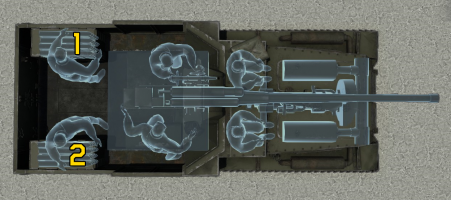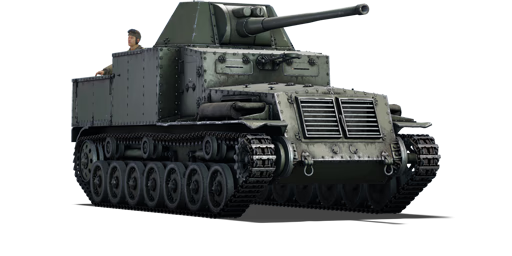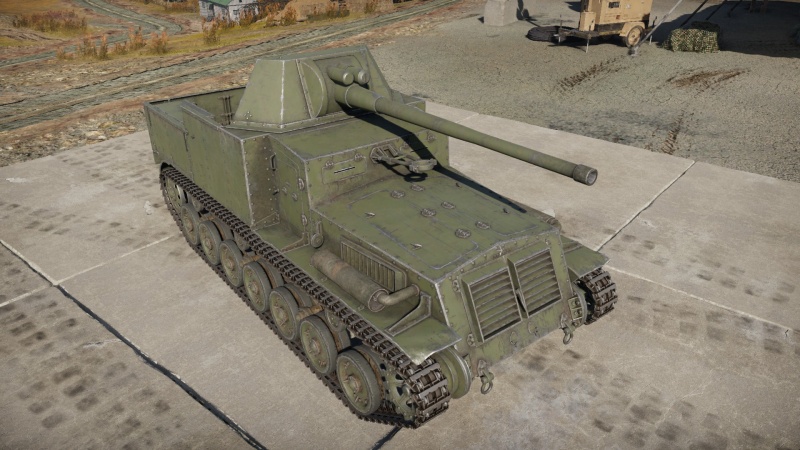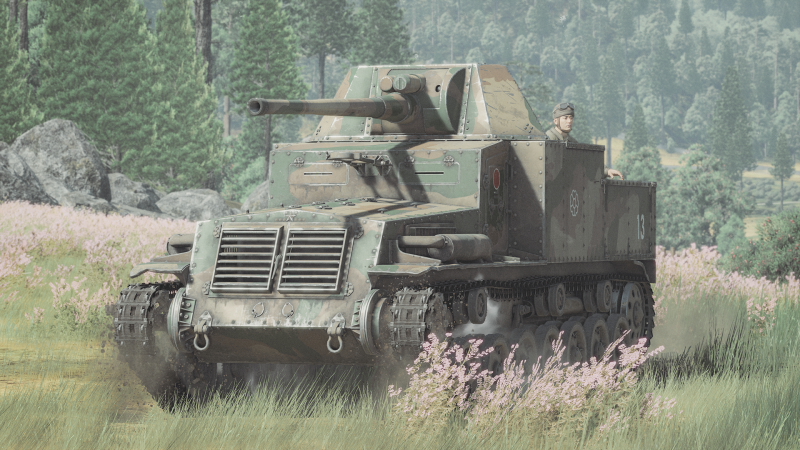Difference between revisions of "Na-To"
(→Pros and cons) (Tag: Visual edit) |
R_nminbiY_n (talk | contribs) m (removed inaccurate con) (Tag: Visual edit) |
||
| Line 143: | Line 143: | ||
* Large vehicle, large target. | * Large vehicle, large target. | ||
* Paper-thin armour of overall 12 mm. | * Paper-thin armour of overall 12 mm. | ||
| − | |||
* Front engine an easy target that will immobilize vehicle if hit. | * Front engine an easy target that will immobilize vehicle if hit. | ||
* Open-top crew compartment exposes crew to artillery and airstrikes. | * Open-top crew compartment exposes crew to artillery and airstrikes. | ||
Revision as of 00:58, 15 May 2022
Contents
Description
The Type 5 Na-To (試製七糎半対戦車自走砲「ナト」) is a rank III Japanese tank destroyer with a battle rating of 3.3 (AB/RB/SB). It was introduced along with the initial Japanese Ground Forces tree in Update 1.65 "Way of the Samurai".
The Type 5 Na-To is a rather traditional tank destroyer of a simple vehicle chassis with a gun pasted on top. It is highly vulnerable to many battlefield weapons due to its weak overall armour, but if it can get the jump on an enemy, it can wreck havoc. Thus, one should not play the Na-To as a front-line weapon but as a sniper far back behind the front lines. This will ensure the Na-To will not become a priority target and also to maximize the gun's long-range capacity to take out targets. Watch frequently traveled roads and choke points for enemy, then blast them away before retreating to reload in case they are still active after the first shot.
General info
Survivability and armour
Armour type:
- Rolled homogeneous armour
- Cast homogeneous armour (Gun mount)
| Armour | Front | Sides | Rear | Roof |
|---|---|---|---|---|
| Hull | 12 mm (25°) Front 12 mm (52°) Bottom 8 mm (83°) Engine deck 12 mm (6°) Driver's plate |
12 mm | 4 mm (1°) Top 8.5 mm (46°) Bottom |
8 mm |
| Gun mount | 12 mm (21°) Gun mount 30 mm (6-73°) Gun mantlet |
12 mm (26°) | N/A | N/A |
Notes:
- Suspension wheels and tracks are both 15 mm thick.
- Belly armour is 8.5 mm thick.
Mobility
| Game Mode | Max Speed (km/h) | Weight (tons) | Engine power (horsepower) | Power-to-weight ratio (hp/ton) | |||
|---|---|---|---|---|---|---|---|
| Forward | Reverse | Stock | Upgraded | Stock | Upgraded | ||
| Arcade | 44 | 9 | 13.7 | 234 | 315 | 17.08 | 22.99 |
| Realistic | 40 | 9 | 146 | 165 | 10.66 | 12.04 | |
Modifications and economy
Armaments
Main armament
| 75 mm Lightweight Type I Model II | Turret rotation speed (°/s) | Reloading rate (seconds) | |||||||||||
|---|---|---|---|---|---|---|---|---|---|---|---|---|---|
| Mode | Capacity | Vertical | Horizontal | Stabilizer | Stock | Upgraded | Full | Expert | Aced | Stock | Full | Expert | Aced |
| Arcade | 40 | -8°/+19° | ±20° | N/A | 5.28 | 7.31 | 8.88 | 9.82 | 10.45 | 7.67 | 6.79 | 6.25 | 5.90 |
| Realistic | 3.57 | 4.20 | 5.10 | 5.64 | 6.00 | ||||||||
Ammunition
| Penetration statistics | |||||||
|---|---|---|---|---|---|---|---|
| Ammunition | Type of warhead |
Penetration @ 0° Angle of Attack (mm) | |||||
| 10 m | 100 m | 500 m | 1,000 m | 1,500 m | 2,000 m | ||
| Type 1 APHE | APHE | 140 | 137 | 125 | 111 | 99 | 88 |
| Type 4 APCR | APCR | 177 | 175 | 151 | 127 | 108 | 91 |
| Type 90 HE | HE | 8 | 8 | 8 | 8 | 8 | 8 |
| Shell details | |||||||||
|---|---|---|---|---|---|---|---|---|---|
| Ammunition | Type of warhead |
Velocity (m/s) |
Projectile Mass (kg) |
Fuse delay (m) |
Fuse sensitivity (mm) |
Explosive Mass (TNT equivalent) (g) |
Ricochet | ||
| 0% | 50% | 100% | |||||||
| Type 1 APHE | APHE | 830 | 6.56 | 1.3 | 15 | 84.8 | 47° | 60° | 65° |
| Type 4 APCR | APCR | 930 | 4.15 | N/A | N/A | N/A | 66° | 70° | 72° |
| Type 90 HE | HE | 830 | 6.17 | 0 | 0.1 | 490 | 79° | 80° | 81° |
Ammo racks

| Full ammo |
1st rack empty |
2nd rack empty |
Visual discrepancy |
|---|---|---|---|
| 40 | 21 (+19) | 1 (+39) | No |
Note:
- Left side empty: 21 (+19) shells.
Usage in battles
With the Lightweight Type I Model II tank gun, the Na-To presents a lethal gun that can penetrate all the the tanks at its 3.3 BR range. Assuming it is not upped by another vehicle in the line-up with a higher BR, the worst heavy tank the Na-To could face are the Soviet KV-1S and British Churchill Mk III, both with front armour easily penetrable by the Na-To's 75 mm gun at standard ranges without taking angling into consideration. However, the thin armour of the Na-To does mean that any tank it faces could defeat the Na-To, so always get the first shot off at the enemy.
Playing the Na-To as a sniper support from a long distance from the front-line will provide the Na-To increased survivability and also potentially more targets to aim at than with its limited traverse arc up close. If long range is not possible, keep the Na-To stationed at a cover's corner watching an enemy's frequented area. As soon as one shows up, blast away before retreating to cover.
Pros and cons
Pros:
- High penetrating 75 mm cannon can pretty much destroy any vehicle in its BR range.
- Gun can traverse a rather wide angle to the side.
- Six-man crew can provide some degree of crew loss before a crew knockout occurs.
- Rear ammo racks can lessen the chance of front penetrations detonating it.
- Excellent reloading speed for a gun of such high penetration and damage.
- The armour is sometimes too thin for APHE fuses to go off, causing little to no damage inside the vehicle.
Cons:
- Large vehicle, large target.
- Paper-thin armour of overall 12 mm.
- Front engine an easy target that will immobilize vehicle if hit.
- Open-top crew compartment exposes crew to artillery and airstrikes.
- All the crew are rather lined up, leading to shells able to knock out 2-4 crew members at a time.
- Two prominent ammo racks on the rear sides of the cabin, easy targets to ammo-rack kill.
History
The Type 5 Na-to was a tank destroyer based on the Type 4 Chi-So armored medium tracked carrier developed in 1945. It used a 75 mm tank gun, known as the Type I 75 mm. This was a lighter version of the Type II 75 mm tank gun used by the Chi-To and Chi-Ri.
The Na-To had two prototypes, known simply as the Na-To I and Na-To II. The Na-To I used a variant of the Type I 75 mm gun known as the "Type 1 75 mm Model I". The Na-To II used the Type I 75 mm Model II.
Following trials, the Na-To II was selected over the Na-To I to be mass-produced. An order was placed for 200 vehicles to be made, but by the end of the war only 70 of them were started, with none reaching completion.
Media
- Skins
See also
Links to the articles on the War Thunder Wiki that you think will be useful for the reader, for example:
- reference to the series of the vehicles;
- links to approximate analogues of other nations and research trees.
External links
| Japan tank destroyers | |
|---|---|
| Ro-Go Derivatives | Ro-Go Exp. |
| Chi-Ha Derivatives | Ho-Ni I · Ho-Ni III · Ho-Ro · Chi-Ha LG |
| Ho-Ri | Ho-Ri Prototype · Ho-Ri Production |
| Other | Na-To |
| JGSDF | |
| SPRG | Type 60 (C) |
| SPH | Type 75 · Type 99 |
| ATGM | Type 60 ATM |
| Rocket | Type 75 MLRS |
| USA | ▅M36 |






